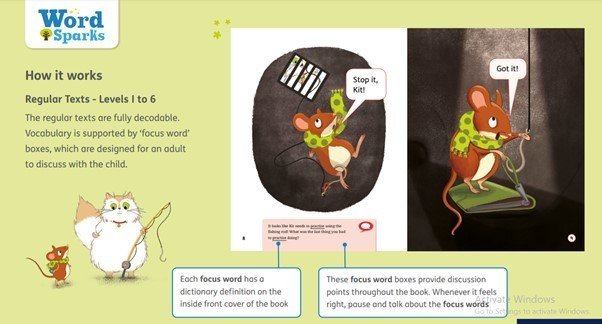Reading
INTRODUCTION FROM MRS REEH
Reception and Key Stage 1
From September 2021 we are implementing the Synthetic Phonics Programme ‘Essential Letters and Sounds’, selected from the Department for Education’s list of validated phonics programmes. The teaching of ‘Essential Letters and Sounds’ begins at the start of Reception through to the end of Year 1. For those children in Year 1, teachers will be following a transition programme to support the children in this change. Currently, children in Reception and Year 1 are reviewing their previous learning, ready to begin the teaching sequence on Monday 20th September. Daily phonics lessons will take place daily for Reception and Year 1.
Parents play a crucial role in the development of a child’s reading journey. Teaching staff will explicitly teach phonemic awareness of the alphabetic code during daily phonics lessons and provide opportunities for children to practise what they have learned in guided reading sessions. We ask that parents provide daily opportunities for children to practise the application of this learning using the decodable reading book that each child will bring home each week.
Each child in Reception and Year 1 will bring home a decodable reading practice book, selected from the Oxford University Press ‘Word Sparks’ reading scheme. This book will align with the Grapheme Phoneme Correspondences (GPCs) taught in the child’s phonics lessons from the previous week. Some of these texts are ‘Partner Texts’ designed with specific parts for an adult and child to read. Your child should be able to read the appropriate parts of the texts by themselves. Listening, supporting and praising your child as they read this book daily will provide invaluable motivation for them to read. Daily readings of the decodable reading practice book will also help to develop fluency and build confidence, both of which are fundamental to the success of becoming a reader.
The decodable readers will be go home with each child from Monday 27th September and be changed each Monday thereafter.
Where a child is not yet secure in phonics and above Year 1, they will have regular phonics interventions to close the gaps in their learning as quickly as possible. In addition, these children will also take home a decodable reader in order to maximise the opportunities for such practice.
Decodable Readers
The decodable readers are from the ‘Word Sparks’ series published by Oxford University Press. The series combines explicit emphasis on vocabulary with systematic synthetic phonics practice. Children will learn new vocabulary at the same time as developing their decoding skills, fluency and comprehension.
 |
 |
 |
Reading for pleasure
In addition to the decodable readers, each child will take home a ‘Reading for Pleasure book’ selected from our school reading spine. For early readers in Reception and Year 1, these books are to be read by an adult with the child sitting close by so that they can see the book too. These books will provide important opportunities to develop children’s comprehension skills, through discussions about the pictures, characters and plots. Children thrive on repetition of books that they enjoy, therefore having this book for a week allows for multiple readings and discussion.
The carefully chosen reading spine from Nursery to Year 6 includes a range of fiction, non-fiction and poetry. These culturally diverse texts and authors have been chosen to reflect the unique cultures and experiences of people living in the wider world.
Expectations for daily reading in Reception and Key Stage 1
| Word Reading | Comprehension Skills | Reading Record | |
| Reception | Parents to support children in practising, segmenting and blending sounds for decodable text (5 minutes) | Parents to read the non-decodable text to their child and discuss what they have read (minimum 5 minutes) | Sign their child's reading record and write a comment on their reading practice. (minimum 3 x per week) |
| Year 1 | Parents to support children in practising, segmenting and blending sounds for decodable text (5 minutes) | Parents to read the non-decodable text to their child and discuss what they have read (minimum 10 minutes) | Sign their child's reading record and write a comment on their reading practice. (minimum 3 x per week) |
| Year 2 | Parents to support children in practising, segmenting and blending sounds for decodable text (5 minutes) | Parents to read the non-decodable text to their child and discuss what they have read (minimum 15 minutes) | Sign their child's reading record and write a comment on their reading practice. (minimum 3 x per week) |
| Parental Reading Record Comments | ||
| Comprehension | Words Skills | Attitude and Interest |
|
|
|
Thriving on repetition
It is not just the number of different stories children listen to that matters. On each re-reading, their familiarity with a story deepens and, with that, comes a greater emotional engagement.
When children ask for a story to be re-read, in effect they are asking for another chance to explore the language, the characters and their feelings, and to relive the emotions they felt on the first reading. They hear the same words read in the same way and gain a sense of comfort in knowing what follows. They wait for their favourite bits, ready to join in or ready to be scared, even when they already know what happens. Their attachment to the story equips them to retell it and, when they have learnt to read, encourages them to read it for themselves.
[Dfe Reading Framework: Teaching the foundations of literacy, July 2021]
Key Stage 2
In Key Stage 2, children will use the Accelerated Reader programme to quiz on the books that they have read, which are appropriate for their reading level. Further information about Accelerated Reader can be found in the FAQ attachment. At school, children are encouraged to read a range of books and talk about the books they have read. Our class libraries provide children with a wealth of texts spanning across a range of genres including information, newspapers, biographies, modern fiction, poetry, picture books and key classics from our literary heritage. Books in class libraries are carefully chosen to make strong links with a range of subjects across the curriculum as well as providing opportunities to explore the culturally diverse world in which we live.
Each Monday, children will choose a book to take home from the class library to read for a week or two if required. In Key Stage 2, children are required to complete their reading records using the pupil comments guidance as part of their reading homework. Once they have read a book (either from the class library or from home), they are able to quiz at home using the Accelerated Reader programme. Children gain points from these reading quizzes which contribute to a half-termly target that is specifically generated for each individual child.
Not all books from the class libraries are eligible for Accelerated Reader quizzes however it is important that children read as many of these books as possible to ensure that they experience a rich diet of literature during their time at St Joseph’s. In Key Stage 2, we encourage parents to ensure that children have opportunities to read aloud to family members, continue to listen to reading by an adult and read silently and independently. As children grow older, the time for independent silent reading should increase.
Books from the class libraries will be updated on a termly basis, with some copies from the previous term being left so that children can continue to enjoy these.
Where a child requires additional opportunities to practise decoding skills, a decodable reading book will also be sent home on a Monday. Children will also receive additional phonics interventions in school to support them in developing their decoding skills quickly and rigorously.
The carefully chosen reading spine from Nursery to Year 6 includes a range of fiction, non-fiction and poetry. These culturally diverse texts and authors have been chosen to reflect the unique cultures and experiences of people living in the wider world.
Accelerated Reader
In KS2, children use the Accelerated Reader programme. Accelerated Reader is a powerful tool for monitoring and managing independent reading practice, motivating the pupils to read for pleasure. Each child will have the opportunity to take a Star Reading Test for each term of the academic year. The Star Reading Test is a computer adaptive test for reading which provides each child with a ZPD (zone of proximal development). Children will have the opportunity to select a book from a level within their ZPD to read. Upon completing each book, children will then take an online quiz using the Accelerated Reader Programme. Each time a child takes a quiz, they have the opportunity to earn points towards their half-termly targets. The points provide an incentive to motivate the children to read a wide range of books independently. Teachers are responsible for monitoring the children’s book choice to ensure they are selecting books of appropriate challenge and that they meet their half-termly targets. Parents have access to the Home-Connect feature of Accelerated Reader, which allows them to check their child’s personal reading progress at home.
Accelerated Reader can be accessed here

